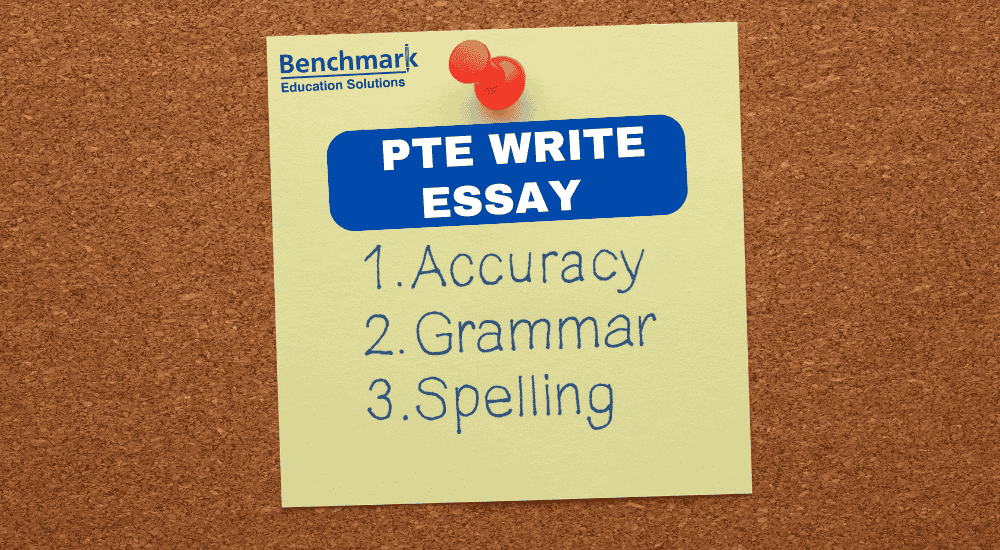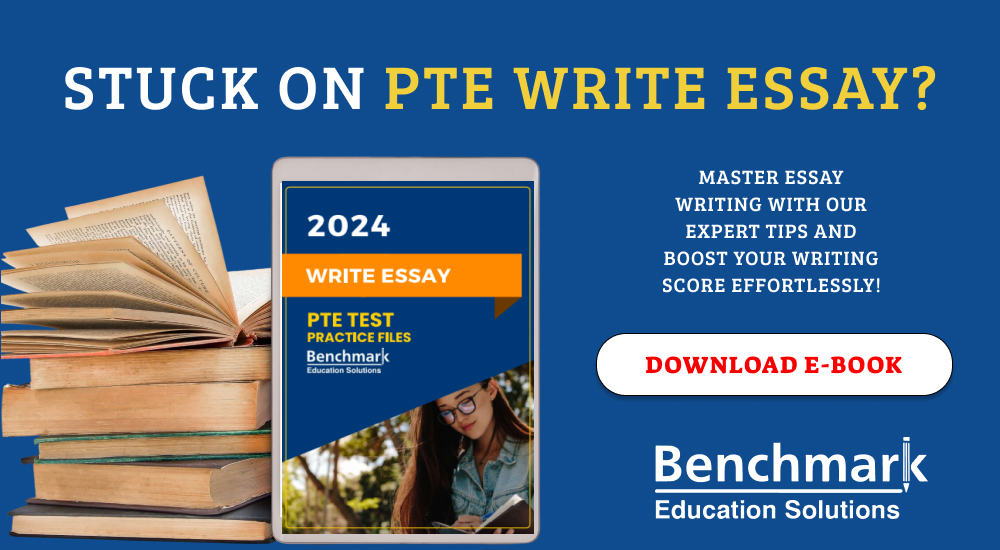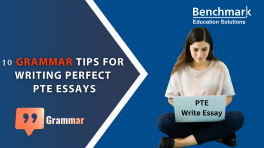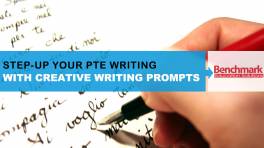Mastering Spelling and Grammar for PTE Write Essay
- 0 Comments


Introduction
Many test-takers of the PTE Write Essay concentrate only on organizing their arguments and presenting thoughts while getting ready. Still, grammar and spelling are quite important for guaranteeing that your work is polished, businesslike, and understandable. Grammatical problems and spelling errors in an essay—even one with great organization—may cost marks.
While spelling guarantees that words are understandable and expresses the intended meaning, grammar guarantees accurate and logical structure of sentences. In PTE, a high-scoring essay is one that is easily read, grammatically correct, devoid of spelling mistakes.
This guide will give you a solid plan to get rid of grammar and spelling mistakes and boost your PTE Writing score. For an example of a top-notch essay, take a look at PTE Sample Essays.
Table of Contents
The Impact of Grammar, Punctuation and Spelling on Your PTE Score
The Importance of Grammar
Grammar makes your writing clear, logical, and professional. It has an influence on several scoring criteria in the PTE Write Essay task, including:
- Content: Your answer needs to be correct to express your argument.
- Coherence & Cohesion: Good grammar helps to link ideas.
- Grammar & Vocabulary: Correct grammar improves your score in this area.
Without proper grammar, even the most brilliant ideas can become puzzling or hard to understand. To find out how to create a grammatically sound essay, take a look at How to Write a High-Scoring Essay in PTE Write Essay.
Why SPAG Matters in PTE Writing
Content, organisation, consistency, punctuation, and spelling all count in your essay. Although many test-takers concentrate on concepts and organisation, mistakes in grammar and spelling may drastically reduce your score.
Here’s why:
- Grammar guarantees clarity. It allows your thoughts to make sense and simplifies phrases.
- Spelling influences readability. Any misspelled word/s might cause misinterpretation of your message.
- Punctuation guarantees intelligible phrases and separates concepts, therefore, enhancing structure.
Also, spelling mistakes have an effect on several parts of the PTE exam, including:
- PTE Writing: Spelling errors reduce your essay and summary scores.
- PTE Reading: Wrong spelling in Fill-in-the-Blanks questions leads to lost marks.
- PTE Listening: In Write from Dictation incorrect spelling results in a zero for that answer.
If they are full of errors, even the finest ideas will not be appealing. To assist you further with your PTE Write Essay, let’s review the key SPAG rules and approaches.
To enhance both grammar and spelling, take a look at Common Mistakes to Avoid in PTE Write Essay.
Key Grammar Rules to Boost Your PTE Score
Grammar plays a crucial role in creating well-structured, error-free essays. Here are the most crucial rules:
1. Subject-Verb Agreement
Subject-Verb Agreement is one of the most fundamental grammar rules in English. It means that the verb must agree with the subject in number (singular or plural). Errors in SVA can make sentences unclear and significantly impact PTE Write Essay scores.
Basic Subject-Verb Agreement Rules
- A singular subject takes a singular verb; a plural subject takes a plural verb.
- Incorrect: The students is writing an essay.
- Correct: The students are writing an essay.
- Incorrect: He write
- Correct: He writes
- A phrase between the subject and verb does not change the number of the subject.
- Incorrect: The list of rules are
- Correct: The list of rules is
(The subject is “list,” which is singular, not “rules.”)
- Two singular subjects joined by “and” take a plural verb.
- Incorrect: My friend and colleague is attending the seminar.
- Correct: My friend and colleague are attending the seminar.
(Since both “friend” and “colleague” are singular, together they form a plural subject.)
- When two singular subjects are joined by “or” or “nor,” use a singular verb.
- Incorrect: Either my mother or my father are
- Correct: Either my mother or my father is
(Only one of them is coming, so the verb is singular.)
- If one subject is singular and one is plural, the verb agrees with the closest subject.
- Incorrect: Either the teachers or the principal are
- Correct: Either the teachers or the principal is
(The closest subject “principal” is singular, so the verb is singular.) - Incorrect: Either the principal or the teachers is
- Correct: Either the principal or the teachers are responsible.
(The closest subject “teachers” is plural, so the verb is plural.)
- Collective nouns can be singular or plural, depending on meaning.
- Singular (acting as one unit):
- The committee decides on new policies.
- The team is playing well.
- Plural (acting as individuals):
- The committee are divided in their opinions.
- The team are discussing their strategies.
- Singular (acting as one unit):
- Some indefinite pronouns always take singular verbs.
- Singular:
- Everyone is invited to the meeting.
- Each of the students has a book.
- Plural:
- A few of the students are absent.
- Some of the books were lost.
- Singular:
- “There is” and “There are” must agree with the noun that follows.
- Incorrect: There is many problems in the system.
- Correct: There are many problems in the system.
- Incorrect: There are a book on the table.
- Correct: There is a book on the table.
- Titles of books, movies, and organizations take a singular verb.
- “The Lord of the Rings” is a famous novel.
- “The United Nations” has many programs.
- Expressions of time, money, and measurement usually take a singular verb.
- Correct: Ten dollars is
- Correct: Five hours is a long time to wait.
2. Sentence Structure
Using a variety of sentence structures makes your essay more engaging, easier to read, and logically connected. In PTE Write Essay, well-structured sentences enhance coherence and readability, contributing to a higher score. Below is a breakdown of simple, compound, complex, and compound-complex sentences, along with their purpose and best use cases.
Sentence Structure Types with Examples
| Sentence Structure | Example | Purpose or Function | When to Use |
|---|---|---|---|
| Simple Sentence | The internet has proven useful. |
|
|
| Compound Sentence | The internet has proven useful, but it can also draw attention away from tasks. |
|
|
| Complex Sentence | The internet has proven useful because it gives people access to an endless supply of information. |
|
|
| Compound-Complex Sentence | The internet has proven useful, but it can also be distracting because people spend too much time on social media. |
|
|
Sample Paragraph Using All Sentence Structures
Topic: The Impact of Technology on Education
Paragraph:
Technology has transformed education (simple sentence). It allows students to access information instantly, but it also increases the risk of distractions (compound sentence). Because online resources are available 24/7, students can learn at their own pace and revisit difficult topics whenever necessary (complex sentence). Many educators believe that digital learning is beneficial, and students appreciate the flexibility because they can choose when and where to study (compound-complex sentence).
Analysis:
- Simple Sentence: Establishes a clear, direct idea.
- Compound Sentence: Connects two related ideas to show contrast.
- Complex Sentence: Adds depth by explaining a reason.
- Compound-Complex Sentence: Expands on the idea by linking multiple points.
To get a detailed walkthrough on how to build sentences, have a look at 10 Grammar Tips for Writing Perfect PTE Essays.
3. Tense Consistency
One of the biggest mistakes test-takers make in the PTE Write Essay section is inconsistent verb tense, also known as “time traveling.” Switching between past, present, and future tenses without a logical reason makes sentences confusing and reduces coherence.
Why is Tense Consistency Important?
- Ensures clarity and readability.
- Helps maintain logical flow of ideas.
- Prevents reader confusion caused by unnecessary time shifts.
- Improves your score in grammar and coherence.
Example:
- The author explains the theory and proved it with examples.
- The author explains the theory and proves it with examples.
Common Tenses Used in PTE Essays
PTE Writing mainly requires three tenses: Present Simple, Present Perfect, and Past Simple. Below is a guide on how and when to use each tense effectively.
| Tense | Example | When to Use It | Common Mistakes to Avoid |
|---|---|---|---|
| Present Simple | Technology improves education and enhances accessibility. |
| ❌ Technology improved education and enhances accessibility. (Mixed past and present tenses) |
| Present Perfect | Technology has transformed education significantly. |
| ❌ Technology had transformed education significantly. (Incorrect use of past perfect) |
| Past Simple | In the past, students relied on libraries for research. |
| ❌ In the past, students rely on libraries for research. (Mixing past and present tenses) |
4. Articles (a, an, the)
Articles might look small, but using them can have a negative impact on your score.
- Use “a” before consonant sounds (for example, a book).
- Use “an” before vowel sounds (for example, an idea).
- Use “the” when you’re talking about something specific (for example, the environment).
Common Spelling Errors & How to Fix Them
Spelling mistakes can significantly impact coherence, readability, and grammar scores in the PTE Write Essay. Even a few misspelled words can confuse the reader, making your arguments less effective. Below are some of the most common spelling errors and how to avoid them.
1. Often Misspelled Words
English spelling can be tricky because it is not always phonetic. Many words contain silent letters or follow irregular spelling rules. Below is a list of frequently misspelled words that often appear in academic writing.
| Incorrect | Correct | Why It’s Often Misspelled |
|---|---|---|
| Accomodate | Accommodate | People forget the double “c” and “m.” |
| Seperate | Separate | The correct spelling contains “a,” not “e.” |
| Neccessary | Necessary | The double “c” and single “s” are confusing. |
| Definately | Definitely | Many people mishear the “i” sound. |
| Independant | Independent | “Ant” is incorrect; it ends in “ent.” |
| Recieve | Receive | Fails the “I before E except after C” rule. |
| Priviledge | Privilege | The “d” is unnecessary. |
| Untill | Until | Only one “l” at the end. |
| Occured | Occurred | Needs double “r” in past tense. |
| Embarras | Embarrass | Needs double “r” and “s.” |
| Manouver | Maneuver | A tricky French-derived spelling. |
| Publically | Publicly | No extra “a” before “ly.” |
| Maintainance | Maintenance | People misplace the “e” and “a.” |
| Writting | Writing | No need for double “t.” |
| Devellop | Develop | The extra “l” is incorrect. |
| Goverment | Government | The “n” after “r” is often missed. |
| Commited | Committed | Needs double “m” and “t.” |
| Enviroment | Environment | The “n” is often forgotten. |
| Persue | Pursue | “Ue” is needed at the end. |
| Responsability | Responsibility | Ends in “ility,” not “ability.” |
How to Fix This:
- Use flashcards with correct spellings.
- Break words into syllables (e.g., sep-a-rate).
- Practice typing or writing these words daily.
2. Silent Letters: Tricky Spelling Errors
Silent letters make spelling challenging because the pronunciation does not match the written word.
| Word | Silent Letter | Why It’s Difficult |
|---|---|---|
| Gnome | G | The “g” is completely silent. |
| Honest | H | The “h” is silent in pronunciation. |
| Sword | W | The “w” is not pronounced. |
| Doubt | B | The “b” is not heard when spoken. |
| Listen | T | The “t” is silent. |
| Psychology | P | The “p” is silent in English. |
| Receipt | P | The “p” is unnecessary in speech. |
| Subtle | B | The “b” is not pronounced. |
| Knuckle | K | The “k” is silent. |
| Fasten | T | The “t” is not spoken. |
How to Fix This:
- Say the word aloud while spelling it.
- Write it down multiple times to reinforce memory.
- Use visual mnemonics, like “Doubt has a silent ‘b’ like ‘debt.'”
To find out how to catch and correct common spelling errors, take a look at How to Proofread Effectively in PTE Write Essay.
Homophones: Words That Sound the Same but Have Different Meanings
Homophones cause spelling mistakes because they sound identical but have different spellings and meanings.
| Homophones | Meaning | Common Mistake |
|---|---|---|
| Bare / Bear | Bare means uncovered; Bear is an animal or to endure something. | “I can’t bare the noise” (should be bear). |
| Their / There / They’re | Their shows possession, There refers to a place, They’re means “they are.” | “They left there books at home” (should be their). |
| Affect / Effect | Affect is a verb (to influence), Effect is a noun (a result). | “The policy had a big affect on education” (should be effect). |
| Principle / Principal | Principle is a rule, Principal is the head of a school. | “The school principle is strict” (should be principal). |
| Complement / Compliment | Complement means to go well with, Compliment is praise. | “Your shoes compliment your outfit” (should be complement). |
| Stationary / Stationery | Stationary means not moving, Stationery refers to office supplies. | “I bought new stationary” (should be stationery). |
| Cite / Site / Sight | Cite means to reference, Site is a location, Sight is vision. | “She visited the construction cite” (should be site). |
| Its / It’s | Its is possessive, It’s means “it is.” | “The dog wagged it’s tail” (should be its). |
| Weather / Whether | Weather is climate, Whether is a choice. | “I don’t know weather I should go” (should be whether). |
How to Fix This:
- Understand the meaning of each word.
- Create example sentences for each pair.
- Read sentences aloud to notice differences in context.
3. Double-Letter Mistakes
Many words contain double letters, but test-takers often forget one letter.
| Incorrect | Correct | Why It’s Misspelled |
|---|---|---|
| Acomodation | Accommodation | Needs double “c” and “m.” |
| Acompaning | Accompanying | Missing second “c.” |
| Embarased | Embarrassed | Needs double “r” and “s.” |
| Comited | Committed | Needs double “m” and “t.” |
| Posesion | Possession | Needs double “s.” |
| Posible | Possible | Needs double “s.” |
| Recomended | Recommended | Needs double “m.” |
| Sucesful | Successful | Needs double “c” and “s.” |
How to Fix This:
- Say the word syllable by syllable (e.g., “ac-com-mo-da-tion”).
- Write the correct spelling multiple times to reinforce learning.
2.5 I Before E Rule (with Exceptions)
A common spelling rule is: “I before E, except after C.”
- Correct: Believe, achieve, friend.
- Exception: Receive, deceive, weird.
However, many exceptions exist, such as:
- Science, species, sufficient, ancient.
How to Fix This:
- Memorize common exception words.
- Break the word into parts to visualize the correct spelling.
Ways to Get Better at Spelling
If spelling gives you trouble, give these tested methods a shot:
Mnemonics for Spelling
Mnemonics help difficult words be remembered more easily.
- Accommodation → Two cots, two mattresses (aCComModation).
- Necessary → One collar, two sleeves (neCessAry).
- Separate → There’s a “RAT” in separate (sepARATe).
Dictation Techniques
- Write down a scholarly passage exactly as you hear it.
- Pay especially attention to grammar, punctuation, and spelling.
- Edit your work against the original text.
Visualizing Methodologies
- See the word in your head, picturing every letter.
- Type it on a notepad or in the air.
- Divide the word (e.g., “un-be-liev-able” for unreal).
Spelling Flashcards
- Create challenging words on flashcards and everyday test yourself.
- Apply spaced repetition: Go over them at intervals—say one day, three days, one week.
3.5 Proofreading Using Target Areas
- Pass 1: Look for tense, subject-verb agreement grammatical errors.
- Pass 2: check spelling mistakes.
- Pass 3: Address clarity and punctuation.
For tips on how to proofread step by step, check out How to Proofread in PTE Write Essay.
Wrapping Up to Succeed in PTE
To get a high score in PTE Write Essay, you need to be good at grammar and spelling. Even if you have strong arguments, you won’t get full marks if your essay has lots of mistakes.
Main Points:
- Grammar makes your writing clear, coherent, and professional.
- Spelling errors make your essay hard to read and affect your overall score.
- Learn mnemonics, try dictation, and study spelling patterns to spell better.
- Practice often with time limits.
By enhancing these core abilities, you’ll give your overall PTE score a boost and walk into the exam room feeling more sure of yourself!
To see top-rated essay samples, take a look at PTE Sample Essays.












